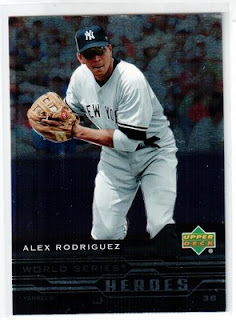Classic card of the week

Alex Rodriguez, 2004 Upper Deck World Series Heros edition
Webster’s defines “hero” as: a man admired for his achievements and noble qualities.
(Side note: Woman cannot be heroes. Sorry, Joan of Arc!)
Dwight Schrute defines “hero” as: The guys who wake up every morning, and go into their normal jobs, and get a distress call from the commissioner, and take off their glasses and change into capes and fly around fighting crime.
Webster’s defines “World Series” as: [the] annual championship of Major League Baseball.
Upper Deck defines “World Series Hero” as: a) a man who has never been to the World Series and who, in fact, has forged a reputation –- whether deserved or not -- as being unable to reach the World Series based on his very own inability to be a hero during specific situations in which a heroic deed would likely ensure himself and his team a berth in the World Series. b) a man with the innate ability to indirectly ruin a World Series he is not even playing in because his agent distastefully announces during an actual World Series game that he is opting out of his multi-million dollar contract, thus upsetting many hard-working, non-hero type people, like police officers, teachers, and firefighters.
But let’s find out more about the criteria it takes to become a World Series hero:

The all-everything shortstop went as far as changing positions in hopes of getting a shot at a World Series ring.
In Rodriguez’s case, changing positions had nothing to do with a) money or b) the fact that the player currently playing shortstop was a beloved American icon who had been on the team for a decade and who stubbornly refused to switch positions. No. Alex Rodriguez switched positions for the sole purpose of winning a World Series ring. Because the easiest way to win the World Series is when you have the best shortstop in the history of baseball playing third base. Also, switching positions for the “good” of the team = ring. Congratulations, Ty Wigginton –- you are a World Series hero!
Rodriguez made the move to third base upon joining the Yankees, perennial title contenders, in 2004.
Upper Deck was quite convinced that Alex Rodriguez would not only immediately win a World Series with the Yankees, but that he would be a hero in this dramatic and make-believe World Series. This wasn’t “jumping the gun,” but simply forecasting the inevitable. In fact, after Game Three of the 2004 ALCS, Upper Deck released the “Alex Rodriguez: Hero of Every World Series Ever Played and Greatest Example of the Noble Qualities That Define 'Hero'” series, which proved to be prophetic. That set sold eight trillion copies. In Boston.
Biggest kudos ever to our good friend Bill for sending this card, who described it as the “best 33 cents I ever spent!” Surely this card will be worth much more when it is inducted into the Ironic Hall of Fame in 2021. So hang in there, Bill!
Before we go, I’d like to rewrite the back of this card in an attempt to update Alex Rodriguez’s World Series hero status:
The all-everything (except shortstop and World Series participant) went as far as possibly having an affair with pop superstar Madonna and admittedly doing steroids in hopes of getting a shot at a World Series ring. Rodriguez made the move by first blaming his cousin, and then mysteriously injuring his hip, all of which will help the Yankees, perennial title contenders, in no foreseeable way whatsoever.
Did you know?
That, or a masked Alex Rodriguez flew into an industrial plant during the 2005 World Series and foiled an evil plot to kidnap Ozzie Guillen.
Comments